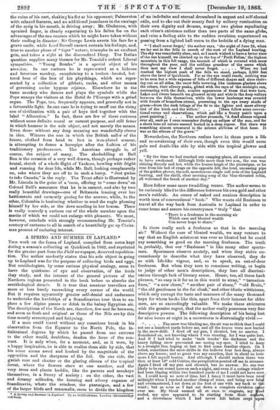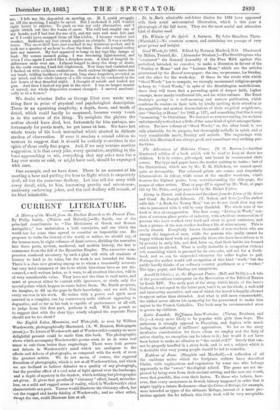. A SPRING AND SUMMER IN LAPLAND.*
Taw work on the fauna of Lapland, compiled from notes kept during a season's collecting at Quickiock in 1862, and reprinted for the greater part from the Field newspaper, deserved republica- tion. The author modestly states that his sole object in going up to Lapland was for the purpose of collecting birds and eggs. But ornithologists, by some curious physical analogy, seem to have the quickness of eye and observation, of the birds they study, and the interest of the general picture of the Northern regions presented in the book before us absorbs the ornithological details. It is true that amateur travellers are more or less busily ransacking every corner of the world. But it requires apparently greater self-denial and endurance to undertake the hardships of a Scandinavian tour than to ex- plore a few Alpine passes or drink in the balmy Egyptian air. The descriptions of the North are, therefore, few and far between, and seem as fresh and original as those of the Nile are by this time mostly stereotyped and fatiguing.
If a man could travel without any conscious break in his observation from the Equator to the North Pole, the in- finitesimal degrees by which he passed from one extreme to the other would, doubtless, deaden the force of the con- trast. It is only when, for a moment, and, as it were, by a happy inspiration, he is able to realize them side by side, that his sense seems awed and hushed by the magnitude of the opposition and the sharpness of the foil. On one side, the garish roar and chatter or the glaring silence of the tropical forest, where the flowers stare at one another, and the very trees and plants huddle, like the parrots and monkeys themselves, in a frenzy of society ; on the other, the vast and dreamy solitudes, the looming and silvery expanse of Scandinavia, where the reindeer, the ptarmigan, and a few of the larger birds and marnmalia, seem to divide the kingdom
• A Spring and Summer in Lapland. By au OldiBualunan. London : Groombridge and Bons. • of an indefinite and eternal dreamland in august and self-elected exile, and to eke out their scanty food by solitary rumination on their own dignity and dreams, suggest two globes repudiating each other's existence rather than two parts of the same globe, and raise a feeling akin to the sudden revulsion experienced on passing from a lighted ball-room to the bedside of a dying man.
"'I shall never forget,' the author says, 'the night of June 24, when we lay out in the fells in search of the nest of the Lapland bunting. The sky was remarkably clear, and, as I much wished to have a better view of the sun himself, we climbed up to the top of 'Peal Fellen,' the highest mountain in this fell range, the summit of which is covered with snow throughout the year, and the sublime grandeur of the scene which then met my view I shall never forget. When we had reached the highest peak of the fells we stood, perhaps, 5,000 feet above the level of Quickiock. Far as the eye could reach, nothing was to be seen but a wide expanse of fells of different shapes and sizes shelv- ing out on all sides, the snow fells towering like immense glaciers above the others, their silvery peaks, gilded with the rays of the midnight sun, contrasting with the dark, sombre appearance of those that were bare. Lakes and rivers beneath me gleamed misty and wide in the deep valleys between the fells themselves, while the lower landscape was covered with forests of boundless extent, presenting to the eye every shade of green—from the dark foliage of the fir to the lighter and more silvery tint of the birch and the willow.' . . . [Here follow some conven- tional verses and observations, which pall like a frouzy patch upon a great painting.] . . . The author proceeds, 'A dead silence reigned over all, such as I once remember during an eclipse of the sun, and for a short time all nature seemed buried in a deep repose. But there was something almost unnatural in the solemn stillness of that hour. It was 10 the silence of the grave.'" Nevertheless, the Northern realms have in these parts a life and re-awakening of their own, though even this would seem pale and death-like side by side with the tropical glower and yell.
"By the time we had reached our camping-place, all nature seemed to have awakened. Although little more than two a.m., the sun was shining fiercely and hot, while the hoarse laugh of the ptarmigan, as he rose from his bed of crags on the opposite fell, the loud, unceasing pipe of the golden plover, the soft, monotonous single call note of the Lapland bunting, and the shrill, clear morning song of the blue-throated robin, all welcomed the break of another day." .
Here follow some more twaddling verses. The author seems to be curiously blind to the difference between his own gold and other men's rubbish. An ounce of naked and anxious description is worth tons of conventional "bosh." Who wants old Bushmen to travel all the way back from Australia to Lapland in order to come home and assure his countrymen " truly " that "There is a freshness in the morning air Which ease and bloated wealth Can never hope to share."
Is there really such a freshness as that in the morning air? Without the ease of bloated wealth, we may venture to say that no English aristocrat was ever so bloated but he could say something as good on the morning freshness. The truth is, probably, that our "Bushman" is like many other sports- men. Sportsmen observe acutely, and when they strive un- consciously to describe what they have observed, they do so with life-like vigour, and, so to speak, an out-of-door freshness. But when they turn to conscious writing, or begin to judge of other men's descriptions, they lose all discrimi- nation through lack of literary sense. Hence, too, all those hack phrases, "so easy is it for us in this world to stray," " tarnation fixes," "a new chum," "another pair of shoes," "old Bruin," "the old gentleman in the fur cloak," and other idiotic witticisms, which only corrupt the taste and manners of the many thousand boys for whom books like this, apart from their interest for older men, are so exceedingly valuable. We make these strictures with the greater regret, that the author really possesses very fine descriptive powers. The following description of his being lost for nine hours at night in a snowstorm is distressingly vivid :—
". . . . The snow was blinding me, the air was so thick that I could not see a hundred yards before me, and all the fences were now buried in the snow-drift. I fired off my gun, I shouted, but no answer. I floundered on, not knowing where I was steering, for .1 was quite lost. And if I had tried to make 'back tracks' the darkness and the heavy falling snow prevented me seeing my spor. I tried to keep to a straight line, hoping at last to find some familiar object. On I toiled, aometimes the snow-drifts in the hollows four feet deep, always above my knees • and so great was my exertion, that in about an hour more I felt myself beaten. And although I should reckon there was then at least 13° cold Celsius, the perspiration poured off me in streams. Again I fired off my gun and shouted, but no answer. No one was likely to be out round hereon such a night, and even if a cottage window had been blazing within two hundred yards of me I could not have seen it. I could keep no note of time, but I fancy it must have been ne midnight when I reached another clump of trees, and being now f and overmastered, I sat down at the foot of one with my back to wind ; but as soon as I had sat down a complete revulsion over me. My blood seemed all at once to stagnate, my feed reeled, my eyes appeared to be starting from their softets, and a drowsiness which I had never felt before creptpenr me. I felt my, life depended on moving, on. If I could struggle on till the morning, I might be saved. But I reckoned it still wanted eight hours to sunrise. To push on was My only alternative, and' I again struck out into the waste of snow. The cold had caught one of my hands, and I had lost the use of it, and my ears and nose felt ,just as if I could have snapped them off like icicles. I became weaker and weaker. Suddenly my foot struck against an obstacle. It was a sunken fence. The snow-drift here just reached to ray waistcoat pocket, and it took me a quarter of an hour to clear the fence. The Gold seemed eating into my marrow. My feet appeared to hang on my legs like lumps of lead. My senses seemed going. I was becoming light-headed, and when I rose again I reeled like a drunken man. A kind of languid in- difference stole over me. I almost longed to sleep the sleep of death. In the early evening I had felt frightened. Now hope had vanishedand I dashed on with reckless exultation.- Such curious thoughts came into my head; trifling incidents of the pasts long since forgotten, crowded on my mind, and the whole history of a life seemed to be condensed in the few hours of that dreadful night. I thought of suicide and loaded my gun. And then I dashed my gun in the snow. I was no longer master of myself, my whole disposition seemed changed. I -moved mechani-
cally as in a trance." .
We doubt whether Defoe or George Eliot, ever wrote' any- thing finer in point- of physical and psychological description. There is an agonizing simplicity, a depth, force, and truth of detail, which could hardly be surpassed, because every touch is in the nature of the thing. To complete the picture the author should have died, but, fortunately for hint perhaps, un- fortunately for poetic truth, he got home at last. We have left whole tracts of his book untouched which abound in delicate strokes of observation. If ever it r' eaches a second edition we venture to suggest that it should be entirely re-written in the skit of these really fine pages. • And, if we may venture another suggestion, it is that every joke, every quotation, anything in the least approaching to wit, everything that any other man but a Lap ever wrote or said, or might have said, should be expunged
with care. • One example, and we have done. There is an account of his meeting a bear and putting the bear to flight which is exquisitely droll, all but the conscious drollery. Let him tell the story,With every detail, with, to him, harrowing gravity and minuteness, anxiously eschewing jokes, and the real drollery will remain, of its kind inimitable.



































 Previous page
Previous page